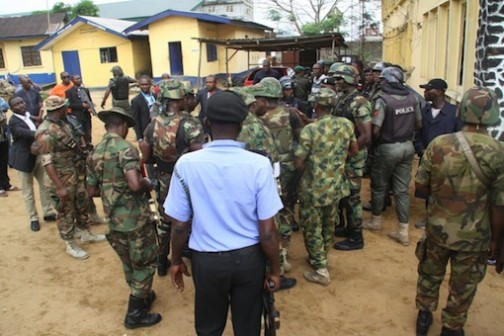That Nigeria is a pluralistic society with a diverse culture and a history of criminal and security-related activities is obvious. Therefore, for security to thrive in such a situation, there is a need for credible intelligence gathering and sharing among security agencies. A situation where a security agency retains its intelligence within itself, aiming to promote unnecessary relevance and competition among other outfits, is counterproductive. This issue must be addressed if the nation desires to address insecurity.
In Nigeria, the intelligence community established the three national intelligence agencies by the National Security Agencies Act, Cap 278 Laws of the Federation of Nigeria 1986, following the dissolution of the Nigeria Security Organisation (NSO). The intelligence community in Nigeria includes the Defence Intelligence Agency (DIA), the Department of State Services (DSS) and the National Intelligence Agency (NIA). The Act also established the Office of the National Security Adviser (ONSA), previously called the Office of the Coordinator of National Security (CONS).
As a newspaper, we note with concern the spate of insecurity in parts of the country, attributable to some security agencies, especially those in the intelligence management circle, working at cross purposes. It is, in our opinion, an issue that deserves prompt attention. While we recognise the efforts of the security agencies in addressing the myriad security challenges, inter-agency rivalry has been identified as the missing link in ensuring a robust and effective security strategy that would bring a gleam of hope to Nigerians. This position was echoed by a former Chief of Defence Intelligence (CDI), who pointed out, rightly, that security requires an efficient intelligence gathering mechanism focused on developing and fine-tuning institutions in this regard. Other experts also posit that this strategy is expected to be multi-pronged, preemptive, and proactive, reflecting unity of effort and comprehensive enough to ensure enhanced national security.
Inter-agency rivalry among security agencies ultimately leads to a lack of intelligence sharing, weak central coordination, and credible mechanisms for storing, processing and distributing intelligence within the intelligence community. The tendency for intelligence agencies to gather and process information within themselves is high. This anomaly was raised by concerned stakeholders in the country, including President Bola Ahmed Tinubu, who, at a recent forum, remarked that “Security in the 21st century is cooperative and non-competitive. Terrorism in the North East, banditry in the North West, piracy in the Gulf of Guinea, farmer-herders’ clashes in the Middle-Belt, and separatist agitation in the South East all share one characteristic; they transcend the capacity of any single agency.”
The position of the president is instructive and resonates with the prevailing reality evident in the upsurge in the activities of criminal elements in various parts of the country. The killings in Yelwata, Guma Local Government Area of Benue State, on the night of Friday, June 13, 2025, where gunmen killed around 200 villagers, and the renewed activities of Boko Haram insurgents in Northeast Nigeria paint a grim picture and explains, vividly, why there must be synergy among the security agencies in arresting the nefarious activities of non-state actors that have posed significant threats to the socio-economic wellbeing of the country.
This is not to say there have not been efforts at addressing this challenge; the position of this newspaper is that a firm and decisive action must be taken by the government to address the root cause instead of scratching the surface. One notable effort is expanding the intelligence management circle to include the National Counter-Terrorism Centre (NCTC) to provide leadership, coordination and strategic guidance to the Armed Forces and intelligence agencies on Counter-Terrorism matters. It is thus incumbent that, with such a mandate, the lack of synergy among the intelligence gathering agencies could be addressed effectively given the right framework. This is on the heels that the Directorate of Intelligence of the NCTC serves as an all-source intelligence production facility focused on timely identification of threats to national security for informed strategic response.
The need for the intelligence agencies to work harmoniously cannot be overemphasised. The overarching objective should remain the common goal of addressing the security challenges in the country. Thus the position of this newspaper that instituting a robust mechanism that would eliminate inter-agency rivalry among our security agencies is long overdue. This can be achieved when roles and responsibilities are spelt out to address overlapping or conflicting mandates. Given the evolving dynamics of security threats, improved funding and an upgrade in the technological capacities of these agencies to work effectively are essential. Even more compelling is the duty of security agencies -the Army, Navy, Air Force, and, of course, the Police, who form the bulk of intelligence consumers, to share the same for effectively attaining set security goals. This is the urgency of now.





